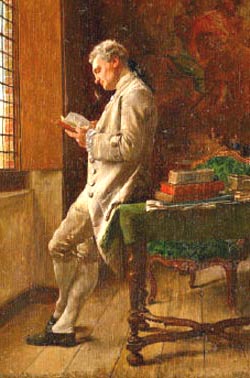 |
Women and Men in Society
The Four Temperaments - Part I
The Sanguine and Melancholic
Fr. Antonio Royo Marin, O.P.
Many persons have asked if we could post a concise summary of the four temperaments on our site. We could think of no more solid exposition than that of Fr. Antonio Royo Marin, a renowned moral theologian of Salamanca. From his work titled The Theology of Christian Perfection, we transcribe this first part of his description of the temperaments.
Psychologists have many opinions about the definition and classification of temperament. For our purposes we define temperament as the pattern of inclinations that proceed from the physiological constitution of the individual. It is a dynamic factor that takes into account the way that the individual will react to stimuli of various kinds.

El Greco captures the sanguine spirit of St. Peter, left, and choleric nature of St. Paul, right |
Since it is rooted in the physiological structure, temperament is something innate and hereditary. It is that element of personality which makes the personality unique, since individuality is rooted in matter, and temperament is the natural inclination of the somatic structure. It is, therefore, something permanent and admits of only secondary modification. One's temperament can never be totally destroyed without destroying the individual. The axiom "grace does not destroy nature but perfects it" has its most obvious application in the area of temperament.
The classification of the temperaments is nothing more than a handy framework which has been constructed according to the predominant characteristics of various physiological constitutions. It is by no means exclusive or definitive, nor does it signify that there are "pure" temperaments.
As a matter of fact, individual persons generally manifest a combination of the characteristics of several temperaments. Whenever there are several elements combined in any composite, however, one or another will usually predominate at any given time. In the matter of temperament we find that, although persons are usually a composite of many characteristics, one or another characteristic will specify the temperament.
Bearing this in mind, we shall discuss the four temperaments according to the ancient classification of sanguine, melancholic, choleric and phlegmatic.
1. The sanguine temperament
A person of sanguine temperament reacts quickly and strongly to almost any stimulation or impression, but the reaction is usually of short duration. The stimulation or impression is quickly forgotten, and the remembrance of past experiences does not easily arouse a new response.

St. Teresa of Avila had to overcome the superficiality of her sanguine nature |
Among the good qualities of the sanguine temperament, we may list the following:
- affability and cheerfulness;
- sympathy and generosity toward others;
- sensitivity and compassion for the sufferings of others;
- docility and submission to superiors;
- sincerity and spontaneity.
There may at times be a violent reaction to injuries received, but all is soon forgotten and no rancor remains. There is no obstinacy and stubbornness but the ability to act with complete self-detachment. Others are attracted by the individual's goodness of heart and contagious enthusiasm.
Sanguine persons usually have a serene view of life and are optimists. They are not discouraged by difficulties or obstacles but hope for a successful outcome in all their efforts. They are gifted with a great deal of common sense and a practical approach to life; they tend to idealize rather than criticize.
Since they possess an affectionate nature, they make friends easily and sometimes love their friends with great ardor or even passion. Their intellects are alert and they learn quickly, although often without much depth. Their memory dwells on pleasant and optimistic things, and their imagination is active and creative. Consequently, they readily excel in art, oratory and the related fields, though they do not often attain the stature of the learned or the scholars.
Sanguine persons could be superior types of individuals if they possessed as much depth as they do facility and if they were as tenacious in their work as they are productive of new ideas and projects. The following saints are examples of the sanguine temperament: St. Peter, St. Augustine, St. Teresa of Avila, St. Francis Xavier and St. Rose of Lima.
The defects of the sanguine temperament
But each temperament will also be characterized by certain qualities which are dangerous and could become predispositions to evil. Thus the principal defects of the sanguine temperament are superficiality, inconstancy and sensuality.

St. Augustine was a sanguine temperament who fought his inconstant and sensual nature |
The first defect – superficiality - is due primarily to the ease and rapidity with which these persons conceive ideas and the creative activity of their imagination. While they appear to grasp in an instant even the most difficult problem or subject, they sometimes see it only superficially and incompletely. As a result, they run the risk of hasty judgments, of acting with insufficient reason, and of formulating inaccurate or false conclusions. They are more interested in breadth of knowledge than depth.
The inconstancy of the sanguine person is the result of the short duration of his impressions and reactions. He may pass quickly from joy to sorrow. He quickly repents of his sins but may return to them on the first occasion that presents itself. Being readily moved by the impression of the moment, he easily succumbs to temptation.
As a rule he is not drawn to abnegation, sacrifice or any effort that is of long duration. For that reason he has great difficulty in observing custody of the external senses and the imagination and is easily distracted in prayer. His occasional periods of great fervor are often followed by discouragement and languor.
From the foregoing it is evident that sensuality finds easy access to the sanguine temperament. Such persons are easy victims of gluttony and lust. They may react strongly and with great sorrow after they have fallen, but they lack the energy and perseverance to fight against the inclinations of the flesh when the passions are again aroused. The entire organism is quickly alerted when the occasion is offered for sensual pleasure, and the strong tendency of the individual to sensuality causes the imagination to produce such phantasms very easily.
Fostering the good and suppressing the bad
The development and control of any temperament requires the fostering of its good qualities and the eradication or suppression of its defects. The sanguine person should utilize his good qualities, such as energy, affection, vivacity and sensitivity, but he should take care that these qualities are directed to objects that are good and wholesome. For him more than for any other person the advice of St. Augustine has special significance: "Choose wisely and then love with all your heart."
At the same time, he must fight against the evil inclinations of his sanguine temperament. To overcome superficiality, he must acquire the habit of reflection and of thinking a matter through before he acts. This means that he has special need of deliberation or judgment as a subjective part of the virtue of prudence.
Against his inconstancy he will strengthen his will to carry through resolutions that have been made and be faithful in the practice of prayer and the performance of good works, even in periods of aridity or in times of hardship and difficulty. The secondary helps which are of the greatest importance in this regard are a plan of life, followed conscientiously, and the daily examination of conscience, with self-imposed penances for failures. Sanguine persons sometimes need an expert spiritual director whom they should obey without question.
Lastly, sensuality must be combated by constant vigilance and an unrelenting struggle. Above all, the sanguine person must flee immediately from the occasions of sin and take special care to observe a strict custody of the eyes. The custody of the external senses and the imagination should be further safeguarded by the practice of recollection and practices of mortification, for it would be futile to try to avoid sensuality if one were to leave the windows of the senses open to every kind of distraction and temptation.
2. The melancholic temperament
The melancholic temperament reacts weakly to stimulus, and it is difficult to arouse; however, after repeated impressions the reaction is strong and lasting, so that the melancholic temperament does not forget easily.
As regards good qualities which serve as predispositions to virtue, persons of melancholic temperament are inclined to reflection, solitude, piety and the interior life.

St. Therese of Lisieux overcame the extreme sensitivity of her melancholic nature |
They are compassionate toward those who suffer, attracted to the corporal works of mercy, and able to endure suffering to the point of heroism in the performance of their duties. They have a sharp and profound intellect, and, because of their natural bent to solitude and reflection, they generally consider matters thoroughly in silence and tranquility.
They may become detached and dry intellectuals, or contemplatives who are concerned solely with the things of God. They usually appreciate the fine arts but are more drawn to the sciences, especially the speculative sciences.
As regards their affective powers, when they love it is with difficulty that they detach themselves from the object of their love. They suffer greatly if others treat them with coldness or ingratitude.
The power of their will is greatly affected by their physical strength and health. If their physical powers are exhausted. Their will is weak and practically null, but if they are in good health and spirits they are energetic workers and joyful in spirit.
They have great sobriety and continence because they seldom experience the disorderly passions which may torment the persons of a sanguine temperament. We may say in general that this temperament is opposed to the sanguine temperament as the choleric temperament is opposed to the phlegmatic temperament.
Among the saints who possessed this particular temperament are St. John, the beloved disciple, St. Bernard, St. Aloysius Gonzaga and St. Theresa of Lisieux.
Unfavorable traits
The unfavorable traits of the melancholic temperament are the following:

The tendency for isolation sometimes is symptom of melancholy |
- an exaggerated tendency to sadness and melancholy;
- an inclination to magnify difficulties and thus to lose confidence in self;
- excessive reserve and timidity, with a propensity to scrupulosity;
- lack of resolution.
Persons of melancholic temperament do not show their feelings as do the sanguine; they suffer in silence because they find it difficult to reveal themselves. They always seem to see the difficult and pessimistic side of things. Many enterprises are never begun because of their lack of confidence and resolution.
Those who are in charge of educating or training the melancholic temperament should keep in mind their strong tendency to concentrate excessively on themselves; otherwise there is danger of doing them an injustice or of treating them in a tactless manner.
It is important to inculcate in these persons a strong confidence in God and in themselves, as well as a more optimistic view of life. Since they have good intellects and tend to reflection, they should be made to realize that there is no reason for them to be timid or irresolute.
At all costs the director must destroy their indecision and cowardice and get them to make firm resolutions and to undertake projects with enthusiasm and optimism. Sometimes it is necessary to give them a special regimen of rest and nourishment and to forbid them to spend long hours in prayer and solitude or to observe fasts.
Continued

Posted May 9, 2009

Related Topics of Interest
 The Calvinist and Lutheran Mentalities The Calvinist and Lutheran Mentalities
 St. Therese, Master of Her Temperament St. Therese, Master of Her Temperament
 R-CR in the Tendencies, Ideas and Facts R-CR in the Tendencies, Ideas and Facts
 The Proper Way to Sit, Stand and Walk The Proper Way to Sit, Stand and Walk
 Vocations of the European Peoples Vocations of the European Peoples
 Teaching Obedience to Young Children Teaching Obedience to Young Children
 Tradition, Stagnation and Progress Tradition, Stagnation and Progress

Related Works of Interest
|
|
Women and Men | Cultural | Home | Books | CDs | Search | Contact Us | Donate

© 2002- Tradition in Action, Inc. All Rights Reserved
|
 |
|